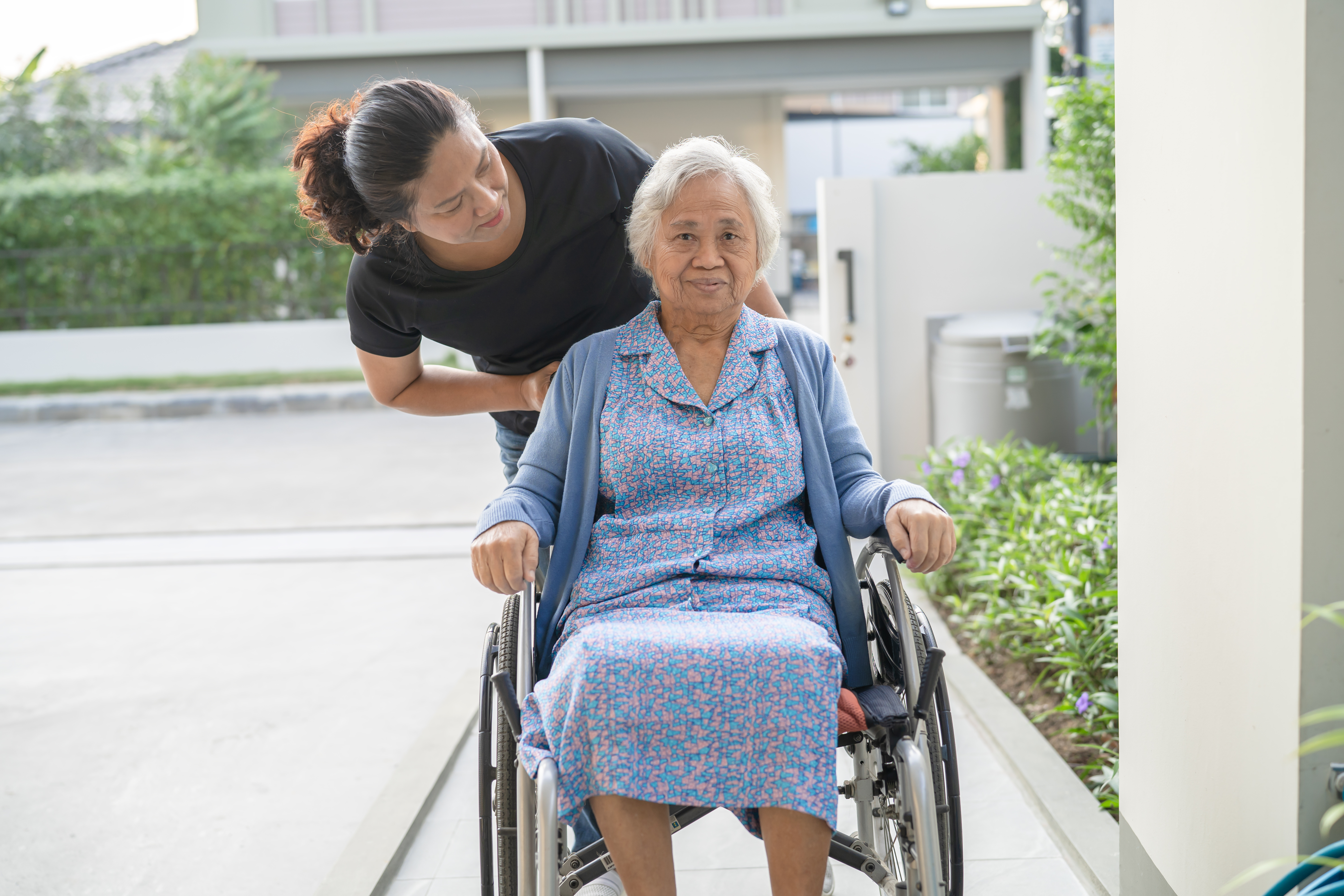How to know when your older adult parent needs help

As your parent ages, it can sometimes be difficult to know when extra help is needed. Subtle signs such as changes in daily habits, forgetfulness, or withdrawing from social activities may indicate the need for additional support. Recognizing these signs early on allows you to have meaningful conversations and explore options that prioritize their safety, well-being, and independence. It’s not about losing autonomy — it’s about ensuring your parent can continue enjoying life with the right level of care.
We all have roles in our families, but there may come a time when your role as a child may begin to shift — when your parent who once seemed to have everything handled might need a little help themselves.
As your parent ages, you might notice changes in their health, memory, or daily routines that might make you wonder if you should step in and offer help. The signs aren’t always obvious either. A once-spotless home might start looking cluttered, or details in conversations may be forgotten. Noticing these changes isn’t about taking away independence — it’s about ensuring the right support is in place to keep life fulfilling and safe.
This guide explores 10 signs that may indicate extra help is needed. With practical tips on what to watch for and how to approach the conversation with confidence and care, the goal isn’t to take away freedom — it’s to ensure continued dignity, comfort, and joy.
1. Daily tasks are becoming overwhelming
We all have days when chores pile up, but if your parent consistently struggles with basic daily tasks — like cooking, cleaning, or managing their medications — it may be time to step in.
Offering help doesn’t mean taking over. Instead, you can work together to find solutions. These may include:
Meal delivery services
Home cleaning support
Daily medication reminders
Small substitutions can make all the difference when it comes to supporting your loved one's independence and care.
2. Changes in personal hygiene
Noticing a change in personal care habits — like unkempt clothing or skipped showers — could signal more than just a shift in preference. Challenges with mobility, cognitive changes, or even a fear of falling in the bathroom can make daily hygiene feel overwhelming.
A gentle, open conversation can help uncover the reason, and together, you can find ways to make their routine safer and more manageable — for instance, installing grab bars in the shower or hiring in-home assistance.
3. Forgetfulness is affecting their well-being
Is your parent or loved one frequently forgetting to pay bills, missing important appointments, or leaving food on the stove?
Memory lapses can happen for many reasons, from normal aging to cognitive changes or simply trying to balance too many tasks.1 Fortunately, small adjustments can help your parent stay on track while maintaining their independence. Consider:
Setting up reminders – Use phone alerts, sticky notes, or a smart home assistant to help them remember important tasks.
Automating bill payments – Reduce the stress of missed payments by enrolling in autopay.
Using a shared calendar – Digital or physical calendars can help you and your parent organize appointments and tasks.
Keeping a consistent routine – Regular daily habits make remembering tasks easier.
Encouraging brain-stimulating activities – Puzzles, reading, or social engagement can help maintain cognitive function.
Minimizing distractions – A clutter-free environment can help improve focus and reduce forgetfulness.
A little structure and support can go a long way in helping your parent feel confident and in control of their daily lives.
4. Unexplained weight loss or poor nutrition
Eating well is a big part of staying healthy, but cooking isn’t always as easy as it used to be. If favorite home-cooked meals have been replaced with snack bars and frozen dinners — or meals are being skipped altogether — it might be time to check in. A little support can help bring back the joy of good food and good health.
Together, you can explore options like:
Grocery delivery services – Ensure they have fresh, nutritious food without the hassle of shopping.
Meal prep services – Pre-made healthy meals can take the stress out of cooking.
Cooking together – Turn mealtime into a fun social activity.
Batch cooking and freezing meals – Having ready-to-eat homemade options can be a game-changer for older adults.
Stocking easy, nutrient-dense snacks – Keep snacks like yogurt, nuts, and fresh fruit on hand.
Meal delivery programs – Some older adult meal delivery programs provide balanced meals tailored to dietary needs.
If changes in appetite or weight loss continue, consider consulting a doctor or nutritionist.2 With the right support, mealtime can remain a source of nourishment and enjoyment.
5. Mobility challenges and increased fall risk
Some signs — like a slower pace, unexplained bruises, or a hesitation to move around the house — can indicate mobility issues. The good news is that there are plenty of steps you can take to modify their house to improve safety and make everyday movement easier. Consider:
Rearranging furniture for clear walking paths
Installing handrails on staircases and in bathrooms
Exploring mobility aids such as walkers or canes
Adding better lighting to reduce tripping hazards
Using non-slip mats and securing rugs
Encouraging movement is just as important as making the home safer. That’s because gentle exercises like stretching, walking, and balance activities can help your parent maintain their strength and stability, promoting mobility and reducing the risk of falls.
6. A shift in mood or social withdrawal
If social plans are getting canceled, favorite hobbies are gathering dust, or your parent just doesn’t seem like their usual self, it could be more than just a passing mood. Withdrawing from friends and activities can be a sign of loneliness or depression, and a little extra support might help bring connection and joy back into daily life.3
Encourage social outings, explore community groups together, or even set up regular video calls with family to keep your loved one engaged and connected.
7. Unfinished household tasks and clutter buildup
If mail is piling up, dishes are left undone, or their home isn’t as tidy as it once was, there might be an underlying reason. Whether it’s physical difficulty, forgetfulness, or a lack of motivation, tackling the issue with your parent can help reduce stress, promote confidence, and ensure a safe and comfortable living space.
In particular, you may want to:
Offer to help organize
Set up a cleaning schedule
Hire occasional housekeeping support
8. Difficulty managing medications
Keeping track of multiple medications can pose a challenge to older adults. It may be time to step in if you notice:
Expired pills
Missed doses
Confusion around prescriptions
A simple fix could be using a pill organizer to make daily doses easy to track. You can also set up medication reminders through a phone app or an automated dispenser. A pharmacy consultation can also help streamline prescription management, ensuring refills are synchronized and dosages are clear. Talk to your medical provider about different strategies to ensure your older parents properly manage their medications.
By working together with your parent, you can develop a strategy that ensures stress-free medication management and peace of mind for both of you.
9. Driving concerns and safety risks on the road
Talking to a parent about driving can be tough — it’s a big part of feeling independent. But if mom or dad is getting lost on familiar routes, reacting more slowly to road signs, or having minor accidents, it may be time to step in. Finding safer transportation options can help keep them mobile while ensuring every trip is a safe one.
Having a thoughtful, sensitive conversation about driving concerns is key. Approach the discussion with empathy, focusing on their independence and quality of life, rather than the loss of freedom. Offer alternatives that can make the transition smoother, such as rideshare services, community transportation options, or a family driving schedule.
These alternatives can help your loved one maintain their sense of autonomy and ensure they can still get out and about, whether for errands, appointments, or social engagements. With the right support, your parent can continue to lead an active and fulfilling life while minimizing the risks of driving.
10. Home safety issues and unexplained injuries
A safe living environment is essential for well-being. If your parent has unexplained bruises, frequently trips over clutter, or struggles with poorly lit spaces, their home may need adjustments.
Improve home safety by decluttering walkways, installing better lighting, and ensuring easy access to essentials. Even minor home modifications — like laying down non-slip mats or installing grab bars — can be a game-changer in preventing accidents and providing peace of mind.
Next steps: creating a plan together
Recognizing these signs doesn’t mean you have to rush into dramatic changes. Instead, it’s best to work together to create a plan that prioritizes your parents’ safety, independence, and well-being.
Start with an honest, open conversation — ask about how things are going, what feels challenging, and what solutions might be helpful. Acknowledge any concerns, but gently emphasize that safety comes first. Then, develop an aging care checklist that meets each concern your loved one has so you both feel more comfortable moving forward.
Remember: Aging is not about losing independence. It’s about adapting in ways that allow our loved ones to continue living life with confidence and dignity. By recognizing these signs early and taking a proactive approach, you’re not just providing help—you’re ensuring your parent has everything needed to thrive.
Schedule a Care Plan
Discover what kind of support your parent needs with a Care Plan. A Care Plan provides personalized recommendations for care, giving you the guidance you need to create a better path forward.






